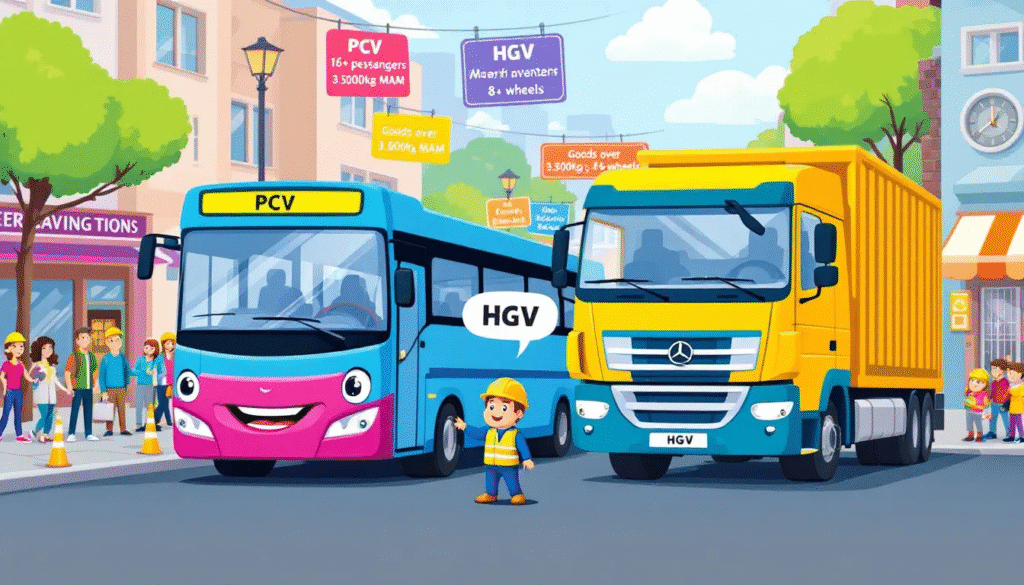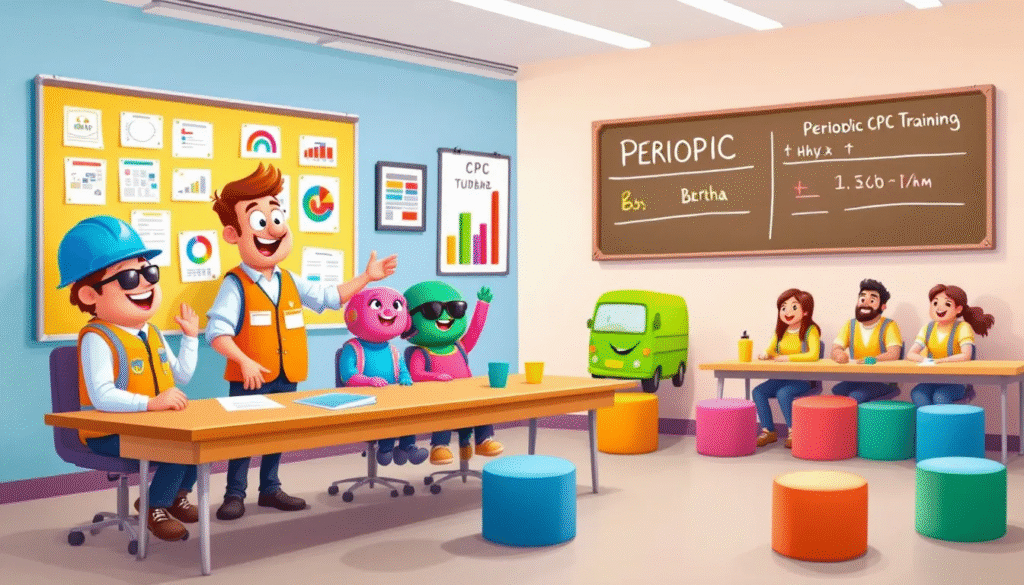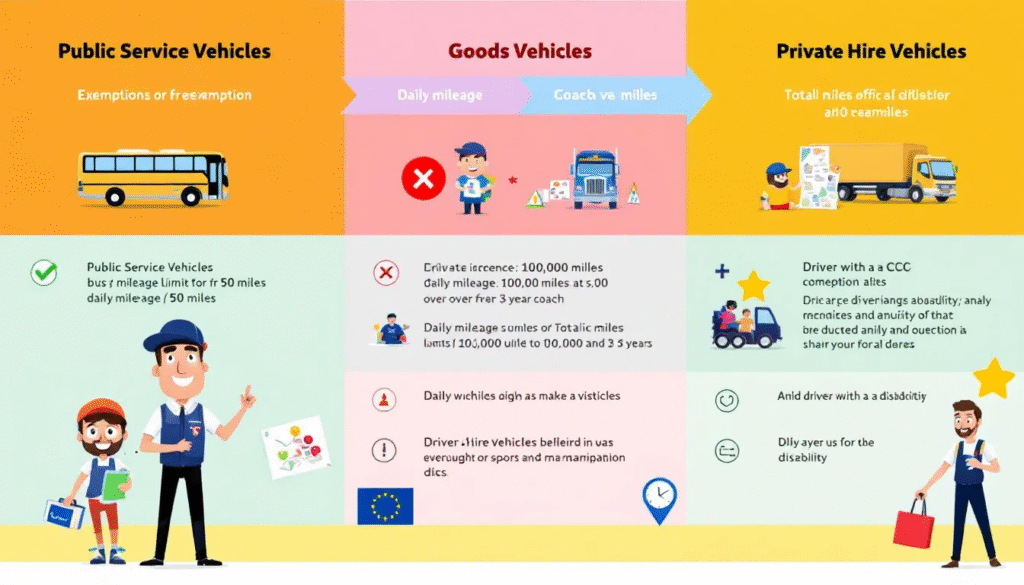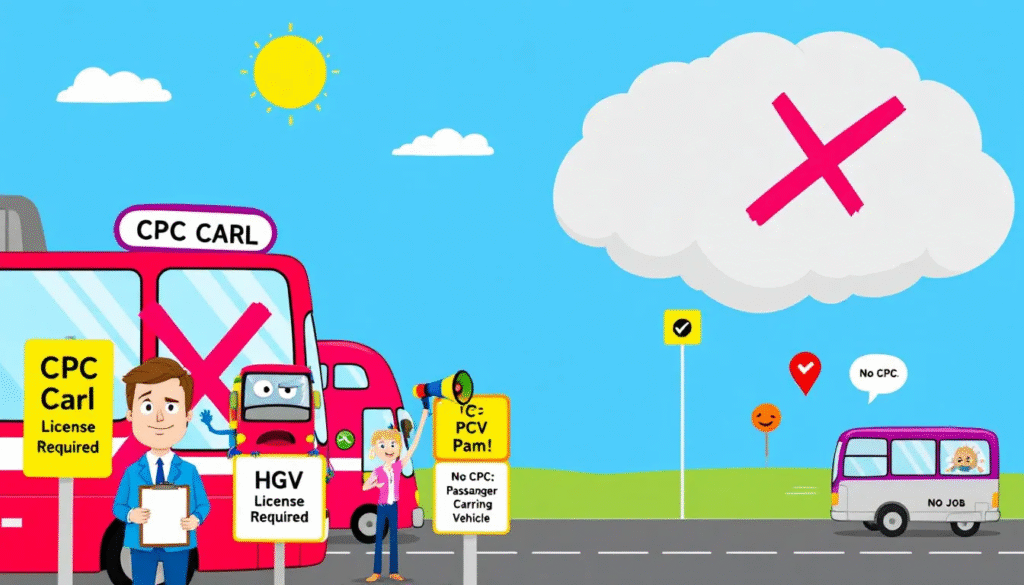Is Bus and Lorry CPC the Same? The quick answer is no. Although both bus and lorry drivers require a Driver CPC (Certificate of Professional Competence), the qualifications and training vary. This article explains these differences, covering necessary tests, vehicle-specific training, and other requirements.
Key Takeaways
- Driver CPC is mandatory for professional bus and lorry drivers, ensuring they meet road safety, operational standards, and environmental awareness.
- There are significant differences in the training, theory tests, and practical assessments required for bus and lorry drivers, reflecting the distinct operational challenges of each vehicle type.
- Maintaining a valid Driver CPC requires 35 hours of periodic training every five years, with exemptions available for certain qualified drivers under specific regulations.
Understanding Driver CPC
Driver CPC, which stands for Certificate of Professional Competence, is a crucial qualification for anyone who drives a lorry or bus as their profession. Introduced in 2008, the aim of Driver CPC is to enhance road safety, raise the professional standards of drivers, and promote environmental awareness. To legally drive a bus or HGV (Heavy Goods Vehicle) professionally, you must hold a driver certificate of professional CPC along with a vocational driving licence.
The qualification process for Driver CPC involves completing all four parts of the initial qualification if you do not have acquired rights. Upon successful completion, drivers are issued a Driver Qualification Card (DQC), which must be carried at all times while driving large goods vehicles or passenger carrying vehicles. Vehicles requiring a Driver CPC typically weigh over 3.5 tonnes or are designed to carry more than nine passengers.
The introduction of Driver CPC has significantly contributed to the professionalism seen in the industry today. It ensures that bus and lorry drivers are not only skilled in operating their vehicles but are also knowledgeable about the latest safety protocols and environmental practices. This mandatory certification underscores the importance of continuous learning and adherence to high standards in professional driving, including the operation of a professional lorry.

Differences Between Bus and Lorry CPC
While both bus and lorry drivers are required to obtain a Driver CPC, the qualifications and training processes for these two types of drivers are distinct. This section will break down the key differences, focusing on the type of vehicles driven, the separate theory tests, and the variations in practical training.
Understanding these differences is essential for anyone looking to embark on a career as a professional driver, whether you’re interested in driving buses or lorries.
Different Vehicle Types
The type of vehicle you plan to drive significantly influences the kind of Driver CPC training and licensure you’ll need. For instance, driving a bus requires a Passenger Carrying Vehicle (PCV) licence, specifically designed for vehicles that transport passengers. In contrast, driving a lorry necessitates a category C or C+E licence, depending on the vehicle’s weight. These differences in licensure reflect the distinct operational requirements of buses and lorries.
Buses and lorries also differ in terms of weight and maneuverability, necessitating separate training programs. For example, a Category C1 licence allows drivers to operate lorries that weigh up to 7.5 tonnes, which is different from the requirements for a lorry or bus licence. This distinction ensures that drivers are well-prepared to handle the specific challenges posed by their respective vehicles, enhancing both road safety and operational efficiency.
Separate Theory Tests
The theory tests for bus and lorry drivers are distinct and tailored to meet the specific requirements of each vehicle type. While both tests include multiple-choice questions, the topics covered are unique to the operational standards of buses and lorries. For instance, bus drivers might be tested on passenger safety protocols, whereas lorry drivers could face questions about cargo management in separate tests.
Understanding these differences is crucial for aspiring drivers. The theory assessments are designed to ensure that drivers are not only proficient in operating their vehicles but also knowledgeable about the specific regulations and safety procedures relevant to their line of work. This targeted approach helps in better preparing drivers for the challenges they may face on the road.

Practical Training Variations
The practical training for bus and lorry drivers also varies significantly. For bus driver, the training includes specific modules focused on passenger transport regulations and safety procedures. This often involves techniques for managing passenger behavior and ensuring safety in a crowded vehicle while carrying passengers on a bus or coach, which is part of your job as a coach driver. Obtaining a bus licence is essential for this role.
On the other hand, lorry driver training emphasizes cargo management and driving techniques for larger, heavy vehicles. Lorry driver training includes practical demonstrations for handling various driving conditions, such as adverse weather and complex terrains.
Both bus and lorry drivers are required to pass practical tests that assess their driving skills and knowledge of safety procedures, but the content of these tests varies significantly based on the vehicle type. This specialized training ensures that drivers are well-equipped to handle the unique challenges posed by their vehicles.
Driver CPC Initial Qualification
Obtaining the Driver CPC is a rigorous process that involves passing all four parts of the qualification. This includes a theory test, a hazard perception test, a case study test, and a practical demonstration test. A full Driver CPC is mandatory for those driving HGVs, buses, or coaches as their primary occupation. The theory test consists of multiple-choice questions and hazard perception tests, with specific pass marks for each section.
Upon passing the initial qualification for Driver CPC, candidates receive a Driver Qualification Card (DQC), which is sent to the address on their driving licence and may take up to three weeks to arrive. This card is a testament to the driver’s competence and is essential for anyone driving professionally.

Initial Qualification Process
The initial qualification process for Driver CPC differs for bus and lorry drivers due to the varying operational purposes of these vehicles. Practical training for bus drivers focuses on passenger transport scenarios, whereas lorry driver training emphasizes cargo handling and regulatory compliance. This ensures that drivers are well-prepared for the specific challenges they will face in their respective roles.
The Driver CPC theory test includes case studies with multiple-choice questions, consisting of 7 case studies with 5 to 10 questions each. The overall score requirement to pass the test is 80 out of 100, with a passing mark of 40 out of 50 for each part.
Parts one and two of the tests can be taken in any order, but part two must be passed before booking the practical test. The Module 4 practical test entails showing and telling specific topics, with a score of 15 out of 20 required in each topic and an overall score of 80 out of 100 to achieve the pass mark.
Case Study and Practical Demonstration Tests
Module 2 of the Driver CPC assesses candidates through case studies with multiple-choice questions. These case studies are designed to evaluate the candidate’s ability to apply their knowledge in real-world scenarios. Candidates are evaluated based on their responses to these case studies, ensuring they can handle various situations they might encounter on the road.
The Module 4 practical test is designed to ensure candidates can demonstrate relevant skills in practical scenarios. This test requires candidates to achieve a score of 15 out of 20 in each topic assessed, highlighting their competence in handling the practical aspects of their job.
This comprehensive testing process ensures that only those who are truly prepared are granted a Driver CPC.
Periodic CPC Training Requirements
Maintaining your Driver CPC isn’t a one-time effort; it requires ongoing commitment. To keep the certification valid, drivers must complete 35 hours of periodic training every five years. This periodic training ensures that drivers stay up-to-date with the latest regulations, safety protocols, and best practices in their field.
If you drive both buses and lorries professionally, you only need to complete one set of periodic training every five years.
35 Hours of Periodic Training
Completing 35 hours of periodic training every five years is essential for the Driver CPC. This requirement serves as a foundational element of the program. This driver cpc training courses is typically conducted in a classroom format and does not involve any tests. Instead, it covers a range of subjects relevant to professional driving, ensuring that drivers are well-versed in the latest industry standards and safety protocols, including driver cpc periodic training.
The Driver CPC qualification lasts for five years, and the periodic training must be completed within this timeframe. This training must be conducted in the country where the driver works or resides, ensuring that the content is relevant to the specific regulations and conditions of that country. This ongoing education is crucial for maintaining high standards in the industry.
Approved Training Centres
Approved training centres play a crucial role in providing the necessary courses for periodic Driver CPC training. These centres are essential for fulfilling the periodic training requirements, ensuring that drivers receive high-quality, relevant education. The courses offered by these centres cover a wide range of topics, from safety protocols to operational best practices. The approved training centres count is vital for assessing the availability of these essential resources.
Non-UK, EU, and third-country licence holders must complete at least 7 hours of periodic training in the UK, ensuring they are familiar with local regulations and standards. This requirement highlights the importance of approved training centres in maintaining the high standards expected of professional drivers.

Exemptions and Acquired Rights
Not all drivers are subject to the same CPC requirements. Some categories of drivers qualify for exemptions, while others may have acquired rights. Understanding these exemptions and acquired rights is essential for compliance and for maximizing your qualifications over time.
Who Qualifies for Exemptions?
Certain drivers do not need a CPC if they hold a Category LGV or PCV licence or an hgv licence. Drivers may operate without completing Driver CPC tests provided they apply the NVT concession. This allows them to drive professionally for up to 12 months before needing to take parts 2 and 4 of the CPC tests.
Drivers with acquired rights must complete periodic training to maintain their Driver CPC. When working under the NVT scheme, drivers must carry their NVT concession card. This ensures that they are still meeting safety and regulatory standards despite not having completed the full CPC process.
Understanding Acquired Rights
Acquired rights refer to a special status allowing certain experienced drivers to be exempt from some CPC requirements. Drivers have Driver CPC through acquired rights if they were previously qualified professional drivers before certain dates. This provision allows them to be exempt from initial CPC tests if they obtained their licences before specific regulations were enacted.
The driving licence serves as proof of Driver CPC for those with acquired rights. However, these rights only apply to the original type of vehicle on the vocational licence. Drivers with acquired rights do not need to carry their licence but must show it if asked by police.
Consequences of Not Having a Valid CPC
Driving professionally without a valid Driver CPC can result in severe penalties. Drivers can face fines of up to £1,000, and legal action can be taken against both the driver and the operator. Operators who allow drivers to work without a valid CPC can also face their own set of legal penalties.
Failure to complete the required CPC training may result in fines and can put a driver’s vocational licence at risk, as authorities may revoke it. These consequences underscore the importance of maintaining a valid Driver CPC and staying compliant with all training requirements.
Summary
In summary, the Driver CPC is an essential qualification for anyone driving buses or lorries professionally. It ensures that drivers are skilled, knowledgeable, and up-to-date with the latest safety and operational standards. Understanding the differences between Bus and Lorry CPC, the initial qualification process, and the periodic training requirements is crucial for maintaining compliance and excelling in a professional driving career.
By staying informed about exemptions and acquired rights, drivers can maximize their qualifications and avoid the severe consequences of not having a valid CPC. The commitment to continuous learning and adherence to high standards not only benefits the drivers but also contributes to overall road safety and professionalism in the industry.
Frequently Asked Questions
What is the Driver CPC?
The Driver CPC, or Certificate of Professional Competence, is a qualification established for professional bus and lorry drivers to improve road safety, professionalism, and environmental awareness. This certification was introduced in 2008 to ensure drivers maintain high standards in their profession.
Do bus and lorry drivers need different types of CPC?
Bus and lorry drivers indeed require different types of CPC; bus drivers need a Passenger Carrying Vehicle (PCV) licence, whereas lorry drivers must obtain a category C or C+E licence, with training specific to each vehicle type.
What does the initial Driver CPC qualification process involve?
The initial Driver CPC qualification process involves passing four parts: a theory test, a hazard perception test, a case study test, and a practical demonstration test. Successfully completing these tests results in the issuance of a Driver Qualification Card (DQC).
How often do I need to complete periodic training for Driver CPC?
You must complete 35 hours of periodic training every five years to maintain your Driver CPC, ensuring you remain informed about the latest industry standards and regulations.
What happens if I drive without a valid Driver CPC?
Driving without a valid Driver CPC can lead to significant penalties, including fines up to £1,000 for both the driver and operator, along with potential legal repercussions and the risk of losing your vocational licence.



